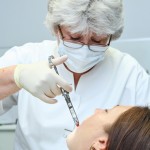
Soft-tissue numbness after local anaesthesia is considerably longer than pulpal anaesthesia and the duration of the typical dental appointment. This often impacts on patients normal daily activities. The aim of this randomized, single-blind study was to evaluate the reversal of soft-tissue anaesthesia using phentolamine in asymptomatic endodontic patients.
Adults patients requiring endodontic therapy in a maxillary or mandibular asymptomatic tooth were randomised toeither phentolamine ( n=46) or sham treatment (39) at the end of the endodontic treatment appointment. Soft-tissue anaesthesia was monitored by patients every 15 minutes for 5 hours with postoperative injection site pain and tooth pain being reported using a Heft-Parker visual analog score every 30 minutes for the first 2 postoperative hours and every hour for 3 hours.
They found:-
- A statistically significant difference in time to return-to-normal sensation for the maxillary lip/cheek and mandibular lip
- Patients who received phentolamine experienced an 88-minute decrease in time to return-to-normal maxillary lip/cheek sensation and a 47-minute decrease in time to return-to-normal mandibular lip sensation
- Phentolamine was not significantly more painful than the sham treatment
- Patients who received phentolamine did not experience significantly more postoperative pain at the injection site
- Postoperative complications were minimal, and no clinically significant adverse reactions to the phentolamine were reported.
The authors concluded:-
Phentolamine would be beneficial for asymptomatic endodontic patients who would like to experience a faster return-to-normal soft-tissue function and sensation after the administration of local anaesthesia.
Fowler S, Nusstein J, Drum M, Reader A, Beck M. Reversal of Soft-tissue Anesthesia in Asymptomatic Endodontic Patients: A Preliminary, Prospective,Randomized, Single-blind Study. J Endod. 2011 Oct;37(10):1353-8. Epub 2011 Aug 5. PubMed PMID: 21924181.
